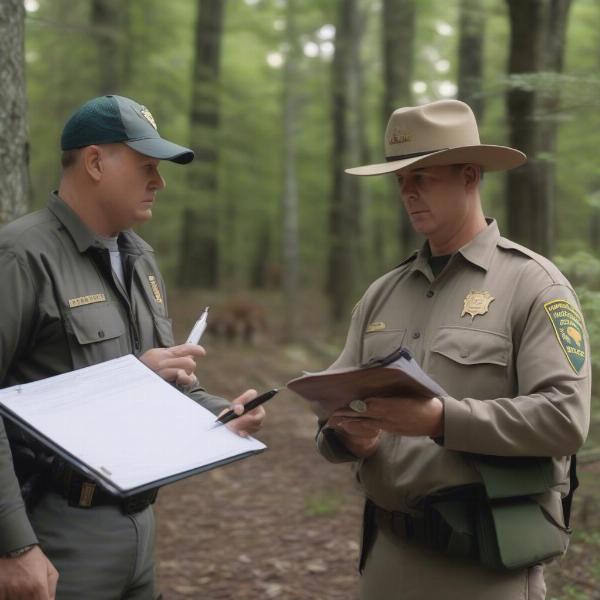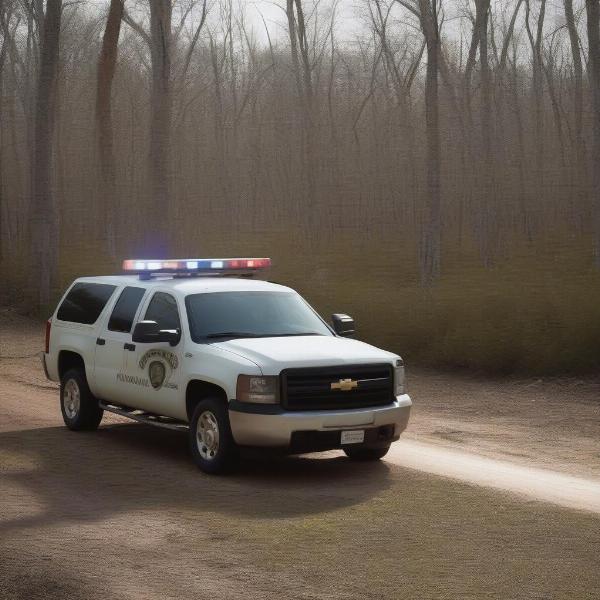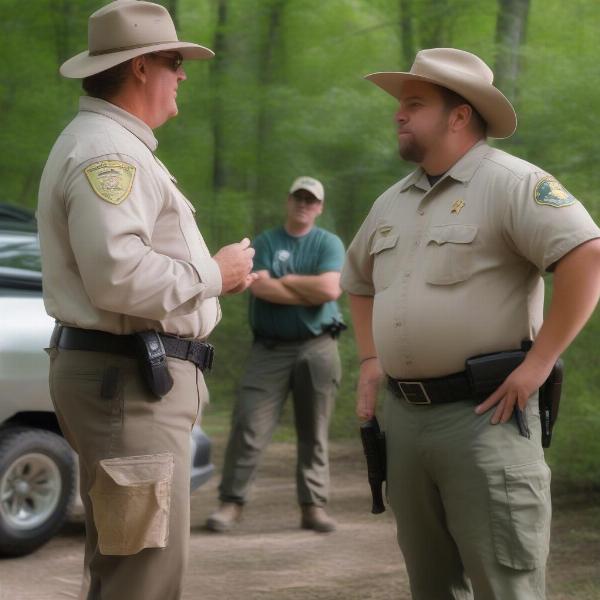Game wardens, the enforcers of wildlife regulations, often operate in complex legal landscapes. This raises the crucial question: does a game warden need a warrant? The answer isn’t always straightforward. It depends on a variety of factors, including the specific situation, the location, and the applicable laws. Understanding these nuances is essential for both hunters and outdoor enthusiasts.
Similar to issues surrounding private property access for game wardens, the warrant requirement is a frequent topic of discussion. You can learn more about private property access in this article: can game wardens go on private property.
Understanding the Fourth Amendment and its Application to Game Wardens
The Fourth Amendment of the U.S. Constitution protects individuals from unreasonable searches and seizures. This generally means that law enforcement officers, including game wardens, need a warrant based on probable cause to search someone’s property. However, there are exceptions to this rule, particularly in the context of wildlife law enforcement.
Exceptions to the Warrant Requirement for Game Wardens
Several exceptions allow game wardens to conduct searches without a warrant. These exceptions often revolve around the unique nature of wildlife management and the need for effective enforcement in often remote and difficult-to-access areas.
Open Fields Doctrine
The Open Fields Doctrine is a significant exception. This doctrine allows game wardens to enter and search open fields, even if privately owned, without a warrant. The rationale is that individuals have a lower expectation of privacy in open fields compared to their homes. However, the definition of “open fields” can be complex and varies depending on the specific circumstances.
Exigent Circumstances
Another exception is exigent circumstances. This applies when there’s an immediate threat to public safety or a risk of evidence being destroyed. For example, if a game warden has reason to believe that illegal hunting activity is occurring at that moment, they may be able to conduct a search without a warrant.
Consent
If an individual consents to a search, a game warden does not need a warrant. However, the consent must be freely and voluntarily given. Game wardens cannot coerce or intimidate someone into consenting to a search.
Plain View Doctrine
The Plain View Doctrine allows game wardens to seize evidence of a crime that is in plain view, even if they don’t have a warrant. For instance, if a game warden is legally on a property and sees illegal game openly displayed, they can seize it without a warrant.
When Do Game Wardens Need a Warrant?
Despite the exceptions, there are situations where game wardens absolutely need a warrant. Generally, a warrant is required to search a person’s home, vehicle, or other areas where they have a reasonable expectation of privacy. This also applies to outbuildings and fenced-in areas considered part of the curtilage of a home. Securing a warrant involves demonstrating probable cause to a judge, which means presenting evidence that suggests a crime has been committed.
What Happens If a Game Warden Searches Illegally?
If a game warden conducts a search without a warrant or a valid exception, any evidence obtained may be inadmissible in court. This is known as the exclusionary rule, which aims to deter illegal searches and seizures. This is why understanding the legal boundaries surrounding game warden authority is so important.
 Game Warden Checking Hunting License
Game Warden Checking Hunting License
State-Specific Regulations Regarding Game Warden Authority
It’s crucial to remember that game warden authority can vary from state to state. Specific laws and regulations differ, impacting when a warrant is required. Hunters and outdoor enthusiasts should familiarize themselves with the laws in their specific state to ensure they understand their rights and responsibilities. For example, some states may have specific regulations regarding the inspection of hunting equipment or game harvests.
Interacting with Game Wardens: Knowing Your Rights
When interacting with a game warden, it’s essential to be polite and cooperative. You have the right to remain silent and to refuse a search if they don’t have a warrant or a valid exception. However, it’s important to understand that refusing a search may not prevent the warden from obtaining a warrant if they have probable cause.
“Knowing your rights and responsibilities is crucial when dealing with game wardens,” says John Doe, a veteran game warden with 20 years of experience. “Understanding the law benefits both law enforcement and the public.”
 Game Warden Patrolling a Wildlife Area
Game Warden Patrolling a Wildlife Area
The Importance of Cooperation with Wildlife Officials
While understanding your rights is essential, cooperation with game wardens and other wildlife officials is vital for effective wildlife management. Game wardens play a critical role in conserving natural resources and ensuring sustainable hunting practices. By working together, we can protect wildlife for future generations.
FAQs about Game Warden Warrants
Here are some frequently asked questions about game warden warrants:
- Can a game warden search my car without a warrant? Generally, a warrant is required to search a vehicle unless an exception applies, such as probable cause or consent.
- Do game wardens need a warrant to search private land? Under the Open Fields Doctrine, game wardens can often search open fields on private land without a warrant. However, they generally need a warrant to search homes and other areas with a reasonable expectation of privacy.
- What should I do if a game warden asks to search my property without a warrant? You can politely ask if they have a warrant. If they don’t, you can refuse the search. However, it’s wise to remain respectful and cooperative.
- Can a game warden search my boat without a warrant? Similar to vehicles, a warrant is typically required to search a boat unless an exception applies.
- How can I learn more about game warden authority in my state? Contact your state’s wildlife agency or consult with a legal professional.
- Can a game warden seize my hunting equipment without a warrant? They can seize equipment in plain view if it’s evidence of a crime. Otherwise, a warrant is typically required.
- What is considered probable cause for a game warden to obtain a warrant? Probable cause is reasonable belief, based on evidence, that a crime has been committed.
 Hunter and Game Warden Talking
Hunter and Game Warden Talking
Game Warden Authority and Public Land Access
Game wardens have significant authority on public lands. While still bound by the Fourth Amendment, they often have broader powers to conduct inspections and checks related to hunting and fishing regulations. This is because public lands are managed for the benefit of all citizens, and game wardens play a key role in ensuring compliance with regulations. This can also connect with the topic of game wardens on private property, highlighting the differences in jurisdiction. For a better understanding of these differences, you can refer to this article: can game wardens go on private property.
Conclusion: Understanding Game Warden Authority and Warrant Requirements
Understanding the complexities of when a game warden does or does not need a warrant is vital for everyone who enjoys the outdoors. By being informed about your rights and responsibilities, and by cooperating with wildlife officials, you contribute to responsible wildlife management and the preservation of our natural resources. Remember to familiarize yourself with the specific laws in your state. By working together, we can ensure the future of hunting and outdoor recreation.

